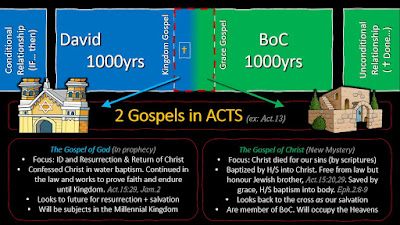The Word of God is God's Words
The Word of God is God's Words The very words we read in the Bible, were put there, not by the creativity of man, not by his interpretation of spiritual things, and not by his wisdom, but by the very direction and purpose of God Himself. |  |
Luke 1:3 It seemed good to me also, having had perfect understanding of all things from the very first [beginning at John's birth], to write unto thee in order, most excellent Theophilus, 4 that you may know the certainty [be 100% sure] of those things in which you were instructed.
We cannot know for sure who Theophilus was, as the Bible does not clarify this, except to say that based on the designation Luke uses, he was probably an important and noble man. However, we can know what Luke's intentions for writing were. His stated reason for writing to Theophilus was "that you may have certainty concerning the things you have been taught".
What was the reason for Luke having such confidence in his writing? As a matter of fact, Luke was not only certain of the things he wrote, but he stated (in verse 3) that he had "perfect understanding of all things from the very first", (meaning, since John's birth to Christ's ascension). This is quite a profound saying! It's reasonable to have a good understanding of events or a time period, but to say that one has perfect understanding is something quite different. Could we say that Luke had "total recall" on the things he wrote?
The rest of this article is my understanding and opinion of this matter.
In 2 Tim.3:16, Paul says that, "All scripture is given by inspiration of God", which means that God directed the content of the scriptures being written. In addition to this statement, Peter says, "For the prophecy came not in old time by the will of man: but holy men of God spake as they were moved by the Holy Ghost." (2 Peter 1:21)
It is clear by these statements that God was overseeing the creating and content of His Word. To this point, we can have faith in the fact that the very words we read in the untainted King James Bible, were put there, not by the creativity of man, not by his interpretation of spiritual things, and not by his wisdom, but by the very direction and purpose of God Himself.
So, with this in mind, and coming back to what Luke writes regarding his "perfect understanding", we have to conclude that Luke was supernaturally empowered (as with all the other writers of scripture) to write the things he wrote, and to warrant his confidence and certainty of information to Theophilus.
In the gospel of John, we read another interesting statement that Jesus mentions regarding one of the workings of the Holy Spirit,
John 14:26 But the Comforter, which is the Holy Ghost, whom the Father will send in my name, he shall teach you all things, and bring all things to your remembrance, whatsoever I have said unto you.
In the context of this statement, I can understand that this is exactly what Luke experienced when he wrote to Theophilus. At the time, Luke did not know he was writing scripture. It was just a very detailed letter to a friend, to document all that Jesus has said and done throughout His earthly ministry. I can imagine that Luke either knew that he was being supernaturally inspired to write because of the working of the Spirit within him, or he just experienced a lengthy moment of extraordinary clarity of though and mind as he penned his letter. Maybe, as Luke was writing it, he recalled what Jesus had said while He was still with them,
Luke 24:44 And he said unto them, These are the words which I spake unto you, while I was yet with you, that all things must be fulfilled, which were written in the law of Moses, and in the prophets, and in the psalms, concerning me. 45 Then opened he their understanding, that they might understand the scriptures,
Sure, the above scripture doesn't hint on recalling all that Jesus said or did, but it does help to understand that Luke had a deep and profound understanding of the purpose of Jesus ministry, death, and resurrection. Luke was able to fully understand how all things regarding the Messiah, the prophets and the Kingdom fit together, and this, in addition to the empowerment of the Holy Spirit to inspire Luke to remembrance of all of Jesus' life and teachings, was that element of certainty and clarity that he wrote to Theophilus about, and this can also translate into the confidence that we can enjoy as we read the scriptures, knowing them to be the very words of God Himself.
Most certainly, Paul also experienced this inspiration and guidance of the Holy Spirit as he penned his letters to the churches. As Paul wrote to the Corinthians, he stated,
1 Cor.2:12 Now we have received, not the spirit of the world, but the spirit which is of God; that we might know the things that are freely given to us of God. 13 Which things also we speak, not in the words which man's wisdom teacheth, but which the Holy Ghost teacheth; comparing spiritual things with spiritual. (Inspired words, 2 Tim.3:16; 2 Pet.1:21)
The Word of God (the King James Bible), is certainly an inspired and miraculous book, one we can trust with all our heart, and one who's advice and wisdom we should eagerly accept. It contains the very words of God, written to provide us with all the information we need for life and godliness in Christ, (2 Pet.1:3-4). Let us make sure to study it in the right context, rightly dividing the information so we can walk straight and sure in the doctrine of grace according to Paul's epistles.
Let me end with this partly edited commentary from Albert Barnes' Notes on the Whole Bible, based on 1 Cor.2:13:
Words are the expressions of thoughts; and if God designed that His truth should be accurately expressed in human language, there must have been a supervision over the "words" used, and that such should be employed, and such only, as should accurately express the sense which God intended to convey.
These words are not that which man‘s wisdom teaches —Not such as human philosophy or eloquence would dictate. They do not have their origin in the devices of human wisdom, and they are not expressed in such words of dazzling and attractive rhetoric as would be employed by those who pride themselves on the wisdom of this world. No. These were the "words" which the Holy Ghost taught —the words which the Holy Ghost imparted to them. The apostles were themselves under the direction of the Holy Ghost, imparting onto parchment the very words of God conveyed to their understanding.



Comments
Post a Comment